On October 19th at the Mount Vernon Quad, sugar and pizza were consumed, and a good time was had!
Students made s’mores and enjoyed the fellowship of friends, make sure you come out to the next UHP event, where good times never end!
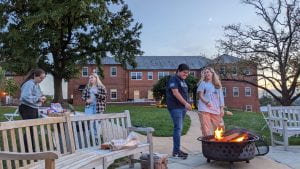
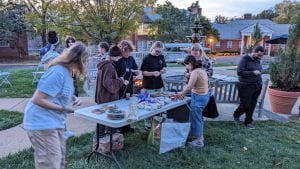
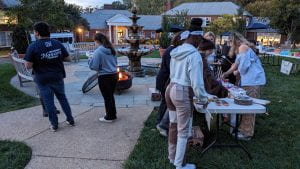
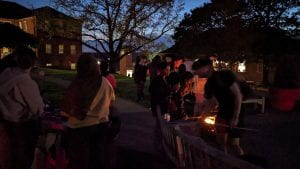
University Honors Program Blog
Intellectual Omnivores Unite
On October 19th at the Mount Vernon Quad, sugar and pizza were consumed, and a good time was had!
Students made s’mores and enjoyed the fellowship of friends, make sure you come out to the next UHP event, where good times never end!




Students from NC State University’s Honors Program visited D.C. during their Fall Break, from October 6th-9th. During their visit, they met up with students from our Honors Program to make connections, explore the city, and see GW’s campus!
On Sunday, students from both programs met in the UHP Townhouse and then walked over to the Renwick Museum to explore the galleries. The next day, the NCSU students returned to campus to meet more of our students and hear from Katie Hendrickson, the Deputy Chief of Staff at the Office of the United States Trade Representative (USTR). Students learned about the function of the USTR, working for the federal government, and were given occupational and networking advice, all while enjoying Chipotle!
Thank you to our friends over in the NCSU Honors Program – we hope to see you in D.C. again soon!
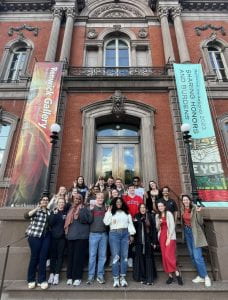


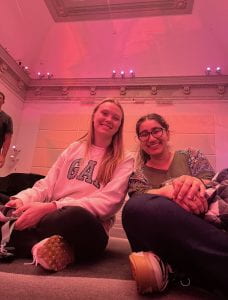
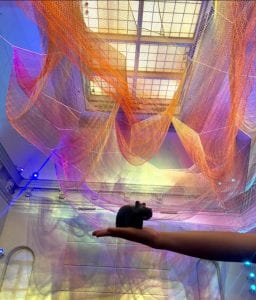
This September, seniors in the “Nature Appreciation” Capstone visited various outdoor sites around D.C., such as the U.S. Botanic Garden and the Smithsonian’s Enid A. Haupt Garden! Students were given the opportunity to appreciate the biodiversity of life found within the city, and take time to (literally) stop and smell the flowers. Be on the lookout for when Professor Moreira offers Capstone again in Fall 2024!


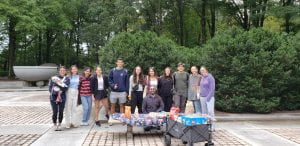

October 2nd through 6th is National Voter Education Week! GW Votes will be tabling, sharing resources, and hosting interactive activities with the GW community on getting registered, navigating mail ballots, creating a vote plan, understanding what’s on the ballot, and more!
Join us at Anniversary Park on Thursday October 5th, from 10am-3pm, or on the Mount Vernon Campus Quad on Friday October 6th, from 12:30-3:30pm!
Major issues don’t take years off. Vote in your 2023 state and local elections to make your voice heard! Statewide elections are occurring in Virginia, New Jersey, Kentucky, Louisiana, Mississippi, and Pennsylvania this November. Ohio, Texas, and Maine will also have statewide referendums on the ballot!
Get #VoteReady this week with GW Votes while enjoying free food and giveaways!
We hope to see you there, and most importantly, we hope you join us in celebrating by registering or requesting your ballot with TurboVote!
Contact gwvotes@gwu.edu with any voter questions.
Students in Professor Matthew Kirwin’s Africa Identities course took in a concert by Niger’s guitar maestro Bombino at the Hamilton Live On September 15th. The students were able to attend thanks to the “Professor on the Town” program. This initiative, which allows faculty to introduce students to events all around Washington, D.C., exposed the students to an artist who sings about the plight of the Taureg, a nomadic ethnic group that resides primarily in the Sahara region of Niger, Mali and Algeria. Bombino recently released his new album Sahel and many of his songs address the humanitarian and security challenges that the Taureg face. Bombino shared his thoughts on recent political events in Niger offering that in instances such as these the poor are the ones who suffer the most. The Bombino concert was also covered by NPR’s Leila Fadel on Morning Edition. Senior Honors Program student Lucas Souza remarked that “Bombino’s music was a great opportunity to take a trip somewhere very far from Foggy Bottom.”
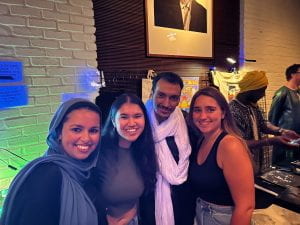
Once again, UHP students demonstrated their skill in cunning in successfully escaping from “The Submarine” and the “Western Bank Heist” in under 60 minutes! If you’re a rising senior who loves games, look for this Capstone option which will be available again in Fall 2024.
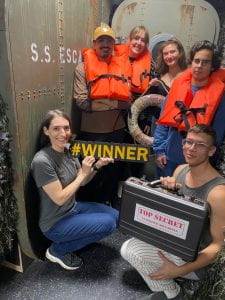
Event Details: This event will take place on Friday, October 6 from 12 pm until 1 pm in the UHP Townhouse. This event requires an RSVP so please fill out this form to let us know you are coming!
Title: AI Does My Homework. What’s the Problem?
Description: With suitable prompting, Generative Artificial Intelligence (GAI) tools such as Bard and ChatGPT can produce content that receives passing grades – even good grades – in some high school and college courses. GAI tools raise many important questions, some of which we should be asking anyway.
Is it unethical for you to use GAI tools in ways your instructor or GW explicitly forbids? Is it unfair to other students who choose to refrain from such prohibited uses? Do prohibited uses somehow wrong your instructor or GW? Do they make you complicit in questionable practices or systems? How likely is it that you’ll be caught and sanctioned? Assuming you get away with it, is it in your long-term self-interest to keep doing it?
These questions lead to deeper ones. How will your college experience figure in your life after graduation? What purposes does college serve? Should college as we know it continue to exist? What’s your responsibility to future generations?
Do you have any ideas or suggestions about the Honors Program that you’d like us to hear? Do you have any questions? Whether you’re a first-year student or nearing graduation, come join the UHP Director, Professor Kung, for a “Breakfast with the Director” event on Friday, September 22nd at 11 am in the Foggy Bottom townhouse Club Room. Please RSVP with the form below:
Are you interested in majoring in Neuroscience or Cognitive Neuroscience? Consider joining GW’s Neuroscience Honors Society, known as NU RHO PSI! For more information and to express interest, click the following link and Join GW NU RHO PSI!
Interested in global connection or working in Foreign Service? Consider getting involved with the Eta Society for Global Affairs, a student organization at GW. The Eta Society for Global Affairs is a professional organization dedicated to promoting leadership of our members in international affairs. We strive for intellectual education that will facilitate growth and encourage our members to pursue careers and curiosity in global service. By this we refer not only to the United States Foreign Service, but extend the definition to include careers in diplomacy, law, banking, education, consulting, journalism, non-governmental organizations, inter-governmental organizations, multinational corporations and much more.
Through professional development and personal growth, our community promotes participation and leadership in foreign service. Together we serve the community, explore world cultures, and build professional and social relationships. We share ideas and experiences in order to understand and stimulate unique, yet great, minds.
The Eta Society promotes professionalism while maintaining an unbreakable sense of membership among our members involved in this truly unique professional organization. We welcome all individuals considering a career in the Foreign Service, as well as those who have passionate interests in other areas of international affairs. Our history is built on the foundations of our previous organization, Delta Phi Epsilon Foreign Service Sorority, and while changing our name was one step of many in upholding our commitment to inclusivity, our organization is built on the same principle of the motto “latreuo” which is Greek for “I Serve”.
Please reach out to etasociety.president@gmail.com with any questions, or follow the group’s instagram to stay up to date!